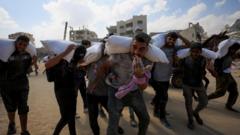Why Are the UK and 27 Nations Condemning Israel for Gaza Civilian Suffering?

The Current Humanitarian Crisis in Gaza: An Urgent Call for Change
The ongoing conflict in Gaza has reached a critical juncture, drawing the attention of the UK and 27 other countries who are calling for an immediate end to hostilities. The plight of civilians has escalated to unprecedented levels, as highlighted by a joint statement from foreign ministers condemning the Israeli government's approach to aid delivery. This situation demands urgent action and raises profound questions about the humanitarian implications of war. The statement emphasizes the inhumane conditions faced by civilians, including the alarming death toll among those simply seeking food and water. This article will explore the current state of affairs in Gaza, the international response, and the broader implications for humanitarian efforts in conflict zones.
The Dire Humanitarian Situation
As the conflict continues, reports from Gaza indicate that the humanitarian crisis has deepened significantly. According to the Hamas-run health ministry, over 100 Palestinians were killed by Israeli fire while waiting for food, and 19 others succumbed to malnutrition. The urgency of the situation is further underscored by the World Food Programme, which warns that Gaza's hunger crisis has reached "new levels of desperation." Civilians are caught in a devastating cycle where basic needs for food and water remain unmet, leading to tragic consequences.
International Outcry and Responses
The joint statement from the UK and 27 other nations marks a significant condemnation of the ongoing violence and humanitarian crisis. It articulates a clear message: "The war in Gaza must end now." The statement highlights the dangers associated with Israel's aid delivery model, describing it as a "drip feeding" approach that not only fuels instability but also strips Gazans of their human dignity. This reflects a growing frustration among the international community regarding the treatment of civilians and the dire need for a shift in policy.
Understanding the Aid Delivery Model
Israel's new aid delivery system, established with the assistance of the US, has been a focal point of international criticism. The Gaza Humanitarian Foundation (GHF) operates with US private security contractors to distribute food parcels from sites located within Israeli military zones. While Israel contends that this system prevents Hamas from stealing supplies, the UN and other humanitarian organizations have refused to cooperate, citing concerns over safety and adherence to humanitarian principles. The ongoing refusal to engage with this new model raises critical questions about the efficacy and ethics of aid distribution in conflict zones.
The Human Cost of Conflict
The human cost of the conflict is staggering. Since the Israeli military response to the Hamas-led attack on October 7, 2023, at least 59,029 people have been killed in Gaza, according to local health officials. The recent reports of deaths while waiting for aid underscore the urgent need for a reevaluation of the current strategies in place. It is essential to recognize that each statistic represents a life lost, a family shattered, and a community devastated. The international community must act decisively to prevent further loss of life and suffering.
Voices from the Ground: Civilian Experiences
Personal accounts from residents in Gaza paint a harrowing picture of daily life amid the conflict. Many families are struggling to secure basic necessities, with some reporting that their children cry from hunger. One father described how his family had only a small plate of lentils to eat over three days, emphasizing the extreme food shortages plaguing the region. Hospitals are also feeling the strain, unable to provide essential care or even basic nutrition for patients, leading to dire consequences for the most vulnerable populations.
The Role of International Law
The joint statement from the 28 nations also addresses the importance of adhering to international humanitarian law. The proposed relocation of Gaza's entire population into a designated "humanitarian city" in Rafah has been deemed unacceptable, as it represents a form of permanent forced displacement. Such actions are not only morally questionable but also violate established international conventions designed to protect civilians in conflict zones. The call for an immediate and unconditional ceasefire reflects a broader desire for a sustainable political resolution to the conflict.
Potential Pathways to Peace
Addressing the humanitarian crisis requires a multifaceted approach that encompasses both immediate relief efforts and long-term political solutions. The international community must encourage dialogue among all parties, emphasizing the need for a ceasefire and the release of hostages. Diplomatic efforts should focus on establishing a framework that ensures the protection of civilians and facilitates the safe delivery of humanitarian aid. Recognizing the state of Palestine could be a pivotal step toward achieving lasting peace and stability in the region.
The Future of Humanitarian Aid in Conflict Zones
The situation in Gaza serves as a stark reminder of the complexities surrounding humanitarian aid in conflict zones. As the international community grapples with how to effectively deliver assistance while ensuring the safety of aid workers and recipients, innovative solutions must be explored. Collaboration between various humanitarian organizations and governments will be crucial in developing strategies that uphold the principles of neutrality and impartiality. The focus must remain on the needs of the civilians, prioritizing their safety and well-being above all else.
Conclusion: A Call to Action
The humanitarian crisis in Gaza is a pressing issue that requires immediate attention and action from the global community. The joint statement from the UK and 27 other nations highlights the urgent need for an end to hostilities and a reevaluation of aid delivery methods. As the civilian population continues to suffer, the time for decisive and compassionate action is now. It is essential for nations to come together, not just to condemn the violence, but to work collaboratively towards a sustainable solution that prioritizes human dignity and peace.
FAQs
What is the current humanitarian situation in Gaza?
The humanitarian situation in Gaza is dire, with thousands of civilians suffering from malnutrition and lack of access to basic necessities like food and water. The ongoing conflict has led to a high death toll, with reports of civilians being killed while waiting for aid.
What are the main issues with Israel's aid delivery model?
Israel's aid delivery model has been criticized for being unsafe and ineffective. The new system, operated by the Gaza Humanitarian Foundation, has faced condemnation for its reliance on private security contractors and for failing to align with international humanitarian principles.
What steps are being taken to address the crisis in Gaza?
The international community is calling for an immediate ceasefire and a reevaluation of current aid delivery methods. There is also a push for diplomatic efforts to promote dialogue among all parties involved in the conflict, with the aim of establishing a sustainable political resolution.
As we reflect on the current situation in Gaza, it is crucial to consider how we can contribute to humanitarian efforts and advocate for the protection of civilians in conflict zones. What role do you believe the international community should play in resolving such crises? #GazaCrisis #HumanRights #PeaceForGaza
Published: 2025-07-21 19:54:02 | Category: world



